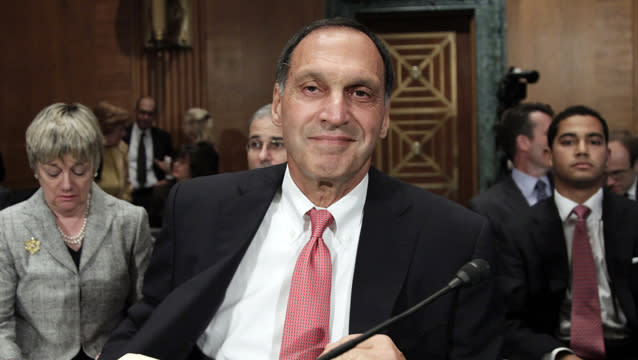CEO Behind Lehman Collapse Isn’t Sorry: Dick Fuld 5 Years Later

Editor's Note: The following is an excerpt from an article published by the Center for Public Integrity, a non-profit, independent investigative news organization. It is reprinted here with permission. In the accompanying video, the story's author examines the lives of former Wall Street executives at the heart of the 2008 financial crisis. You can read the entire story here.
By Alison Fitzgerald, Center for Public Integrity
Five years after the near-collapse of the nation’s financial system, the economy continues a slow recovery marred by high unemployment, hesitant consumers and sluggish business investment.
Many of the top Wall Street bankers who were largely responsible for the disaster — and whose companies either collapsed or accepted billions in government bailouts — are also unemployed. But since they walked away from the disaster with millions, they’re juggling their ample free time between mansions and golf, skiing and tennis.
The Center for Public Integrity looked at what happened to five former Wall Street kingpins to see what they are up to these days. None are in jail, nor are any criminal charges expected to be filed.
Certainly none are hurting for money.
Take Richard Fuld. Five years after Lehman Brothers Holdings Inc., the 158-year-old company he ran, collapsed under the weight of bad investments and sent a tidal wave of panic through the global financial system, Fuld is living comfortably.
He has a mansion in Greenwich, Conn., a 40-plus-acre ranch in Sun Valley, Idaho, as well as a five-bedroom home in Jupiter Island, Fla. He no longer has a place in Manhattan, since he sold his Park Avenue apartment in 2009 for $25.87 million.
Unlike many of his former employees, and unlike the millions of people still out of work after the 2008 financial collapse, Fuld has money.
When Lehman Brothers filed for bankruptcy on Sept. 15, 2008, there was a sense that if Fuld had mismanaged Lehman to death, at least he had lost a load of cash in the process as the value of his company stock dropped to nothing.
And he did lose plenty.
Fuld’s 10.8 million shares of the company that may have once been worth more than $900 million, according to a study by Harvard University Professor Lucian Bebchuk, became worthless.
However, he wasn’t exactly on his way to the poor house. From 2000 through 2007, Fuld took home as much as $529 million from his Lehman job. That includes his salary and cash bonuses, as well as the Lehman shares granted him by the company that he sold before the bankruptcy in September 2008.
That total comes from an analysis by Oliver Budde, a former Lehman associate general counsel who left the firm in 2006 because, he says, Lehman was underreporting its executive compensation to shareholders.
Fuld, through his lawyer, declined several interview requests for this story. He wasn’t in his office when a reporter paid a visit in July. His assistant, through a security guard, declined to say where he was.
No Apologies
Five years after Lehman Brothers declared bankruptcy, Fuld is keeping a low profile. He’s not giving interviews or lectures, and he’s not done an apology tour.
Fuld has been widely criticized for allowing the firm to drown itself in too much debt. When it went bankrupt, for every dollar of capital Lehman held, it was borrowing at least $30. Some reports say the rate was higher than 40 to 1.
That excessive leverage gave the firm no cushion to absorb losses when the market began to decline.
Myriad investigations into the causes of the crisis revealed that under Fuld’s watch, Lehman executives toyed with the company’s finances to make that leverage look better than it really was using what some Lehman employees called an “accounting gimmick” called Repo 105, according to the official bankruptcy report by Anton Valukas of the law firm Jenner & Block.
The tactic allowed the company to characterize a short-term loan as an asset sale and then use the money from that false sale to cut debt. By doing so, Lehman appeared to have less debt and more cash, giving investors a false impression of the bank’s financial health.
“There is sufficient evidence … that Fuld was at least grossly negligent,” Valukas wrote in his report.
Negligence isn’t necessarily a crime, however, so Fuld has faced no punishment for the wreckage caused by his company’s collapse, save perhaps banishment to irrelevance.
Fuld quietly opened his own advisory firm called Matrix Advisors in a Third Avenue office building in Manhattan, across the street from the headquarters of Avon, the cosmetics company. He’s landed a few clients, according to news reports, SEC filings and court records. Matrix advised AT&T Inc. on its failed bid to purchase T-Mobile. And it has consulted with GlyEco, a company that recycles the chemical glycol, and Ecologic Transportation Corp., a company that rents out environmentally friendly cars.
He was recently spotted at Doubles, the private dining club in the Sherry-Netherland Hotel in Manhattan, according to a former Lehman employee.
Still, companies haven’t been eager to have their names associated with Fuld, so landing clients hasn’t been easy, according to two people familiar with the business.
Even if business is slow, it may not matter much to Fuld, who is living a life of quiet luxury after overseeing the largest bankruptcy in U.S. history.
The same can be said of the other four bankers the Center examined — Jimmy Cayne (Bear Stearns), Stanley O’Neal (Merrill Lynch), Chuck Prince (Citigroup) and Ken Lewis (Bank of America) -- as discussed in the accompanying video and detailed here.

